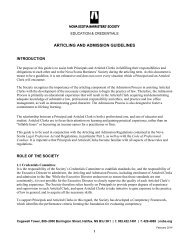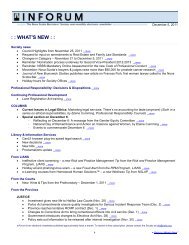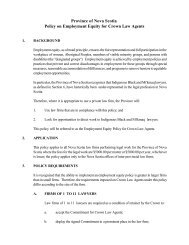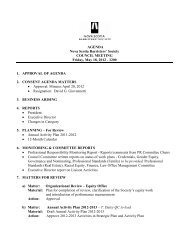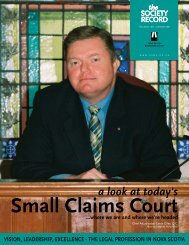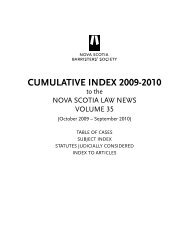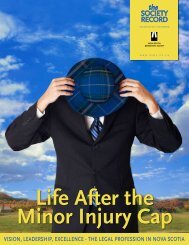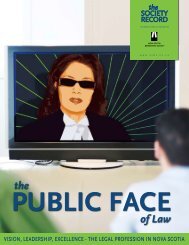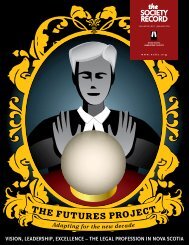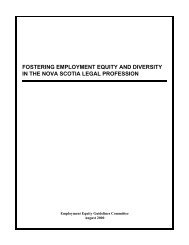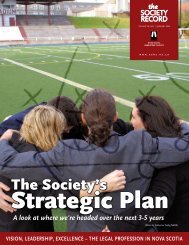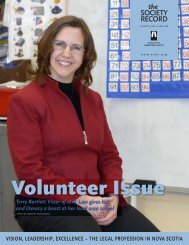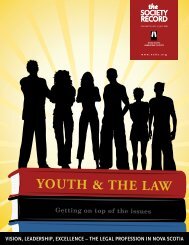SR Vol 27 No 4, October 2009 - Nova Scotia Barristers' Society
SR Vol 27 No 4, October 2009 - Nova Scotia Barristers' Society
SR Vol 27 No 4, October 2009 - Nova Scotia Barristers' Society
- No tags were found...
You also want an ePaper? Increase the reach of your titles
YUMPU automatically turns print PDFs into web optimized ePapers that Google loves.
irony would have it. He had been a teenager: he was now a 36-yearoldman, struggling to relocate himself in the world.Judge Anne S. DerrickProvincial Court of <strong>No</strong>va <strong>Scotia</strong>It is a tradition in Mi’kmawculture that when a persondies, they are not left alonebefore the body is taken from thehome to the funeral. In Donald Marshall Jr.’s case that was particularlyappropriate: Junior did not like to be alone. While there may havebeen a variety of reasons for this, in part it was the effects of prison.That experience, and the wrongful conviction that put him throughit, were etched on his soul. However much Junior transcended thoseterrible events, and the years of struggle that followed his release, hetook the pain of them, locked deep and inaccessible within him, tohis grave. The 20 th anniversary of the Royal Commission of Inquirymust be a time to acknowledge not only the lessons we learned butthe price Junior paid for those lessons.This anniversary will not come for me until January 26, 2010.That was when I took the Commission’s 297 page Report to theMicMac Friendship Centre in Halifax where Junior was holed up,secluded from the press. He was anxiously waiting to hear what theCommission had to say about the wrongs perpetrated against him.He was wondering whether once again he would be faulted for hiswrongful conviction. He had learned through bitter, wrenchingexperience that he could not trust the justice system. He knew theodds did not favour him. Were all the years of agony, including thosein which he watched the grim truth about his case emerge at theCommission’s proceedings, going to have been for nothing? I was notsure that Junior could transcend another devastating blow.By January 1990, I had spent a great deal of time with Junior. I knewintimately how angry and discouraged he was. The burden of hisfight for justice wore on him and weighed him down. He was waryand mistrustful. The Commission was reporting after hearing 89days of evidence, its work spanning a little over three years since itsestablishment in <strong>October</strong> 1986. For Junior, the nightmare had startedalmost 20 years previously on May 28, 1971—his father’s birthday, asPrison equipped Junior for survival in a hostile and dangerousenvironment. I have a photocopy of his prison photographs—“Inmate 1997”—from 1971 to 1979. There are four of them, mugshots in effect, and they show a teen with some vestiges of adolescentpudginess in his face gradually hardening over time until the linesbecome chiseled and angular, the boy grown tall into a man. Juniorwas scarred by his prison experiences, which, as an innocent manand an Aboriginal person, had been all the more painful to endure.The late Jack Stewart, who in 1982 was the Superintendent of thehalfway house—the Carlton Centre—to which Junior was released,testified before the Commission that all those years of incarcerationdeprived Junior of the normal socialization—“the ability to interactwith people, the ability to think in ... a critical fashion as opposed to... a paranoid fashion”—that he needed for life on the street. Junioremerged from 11 years in prison with no institutional supports,supports to which he would have been entitled had he in factcommitted the crime for which he was imprisoned and been releasedon parole. The corrections system had no precedent and no authorityto intervene in Junior’s case. The Commission observed that it was“difficult to imagine a more tragic circumstance,” noting the “bitterirony” in the fact that “the system, which had failed Donald Marshall,Jr. on so many occasions in the past, failed him again even as it senthim back to society.”Junior was left to his own devices and whatever his friends, familyand professional advocates could do for him. He was described inevidence to the Commission as “very soft spoken. He had a lot ofmistrust in the system ... He had a lot of pride and independence,which would have made it difficult for him to say, I can’t manage.”Existing in such a vulnerable state and without resources, Junior hadto try and cope with the corrosive effects of the Court of Appeal’sbegrudging acquittal in 1983 and the compensation negotiations in1983-1984, a process described by the Commission in its Report as“not fair.”As one of Junior’s lawyers at the Commission of Inquiry, and the oneclosest to him personally, I had urged him to believe that this timejustice would be achieved. He had a persuasive case to make that itwould not. If he was hopeful, it was a tiny flickering hope that threwno light into the darkness and turmoil he was experiencing at thetime. He did not really believe the Commission would produce anindictment of the terrible events he had lived for nearly two decades.And so it was a transformative moment, the moment when I wentupstairs to the room he was in at the Friendship Centre and told him,“Junior, you’ve been vindicated: Junior, the Report says the justicesystem failed you at virtually every turn.” I remember that meetingstill, so vividly. For the first time since I had met Junior, there wasvisible relief: it was as though something vast and heavy had beenlifted off him. The unexpected had happened and he was in thosemoments a free man at last.It is that vindication of Junior that I count amongst the most, if notthe most, significant accomplishment of the Commission’s work.Sadly, it was not enough to fully heal the deep wounds inflicted onJunior but it enabled him to move forward with his life in a way thatwas not possible before. It cleared the way for his compensation to bere-evaluated. It gave him the credibility that framed his subsequent18 The <strong>Society</strong> Record



